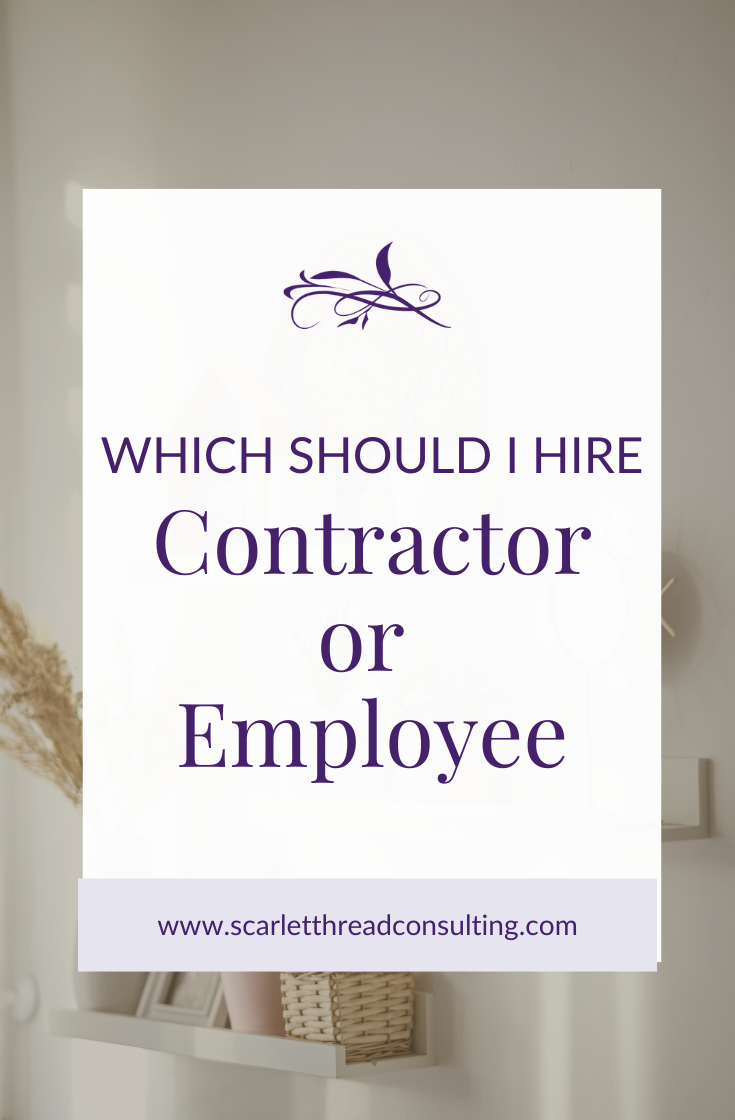Which Should I Hire: Contractor or Employee?
You are ready to hire. The job description is established, now you need to know how to classify your new help. Which should you choose? Let’s look at your business structure, the type of work you need help with and where you live. And don’t forget, how much money you have available. We will tackle the money issues in the next blog.
Your business structure
What type of business do you have? Are you a sole proprietor or LLC or Corporation? You can certainly hire with any of these, but is your business already set up to do payroll? If not, remember when we look at financials that this new service cost will need to be added in.
Identifying clearly how you currently do business and how you want to do business helps. If I know that I need help (even if I have not identified with what exactly), and I also know that I am in a home office that is not big enough for more people, then that will inform my decision. Conversely, if I know that I am moving out of my home or have an office space, that could also play a part in my decisions on hiring.
Are you trying to build a close, in-person team environment, or a bit more autonomous online formation?
What do you need?
In the last blog, we looked at your specific needs for your new hire. Are the skills needed very specialized and expensive, and only needed rarely? That may be an indicator that outsourcing (contract) may work best.
When you look at the company's needs, we also should ask the question, “how long will I need this assistance?” If the answer is short-term, we may consider contract help. If the answer is long-term, maybe an employee would be a better fit. With work done daily and repetitively, perhaps contract is not the best solution.
Another way to evaluate our needs is this – how much control do I want to have over the work getting done. Because if you want to control the work, the hours, the process, the outcome – you are describing being an employer and should hire an employee. If you are willing to let go of the control and let the person do what needs to be done in their own way, own time, calling their own shots and running their own business – then contractor may be on the table for consideration.
Where do you live?
Where you live matters. First, there are federal guidelines that govern the classification of employee and contractor. You can read up on that here.
The IRS gives us three ways to consider hiring employees vs. contractors. These three categories are behavioral control, financial control, and relationship. Take some time to read the document above. There are consequences to classifying an employee incorrectly and they can be quite expensive. Really take care when you look at this.
But why is the title of this section, where do you live? Because some states have taken an even stricter approach to these guidelines. California is one (AB5 Labor Code/section 2750.3) and others have already instituted their own rules. Make sure to know the legislation in your state.
When choosing between a contractor and an employee know the job description, the frequency of the work, the business structure you would like to create, and the IRS and state regulations. If in doubt, always choose employee.
The Designers’ Inner Circle helps six and seven-figure businesses who are ready to hire to work through these scenarios. Reach out if you would like assistance with the same.
Join our mailing list to receive our monthly newsletter!
By joining, you agree to receive marketing emails from us.

